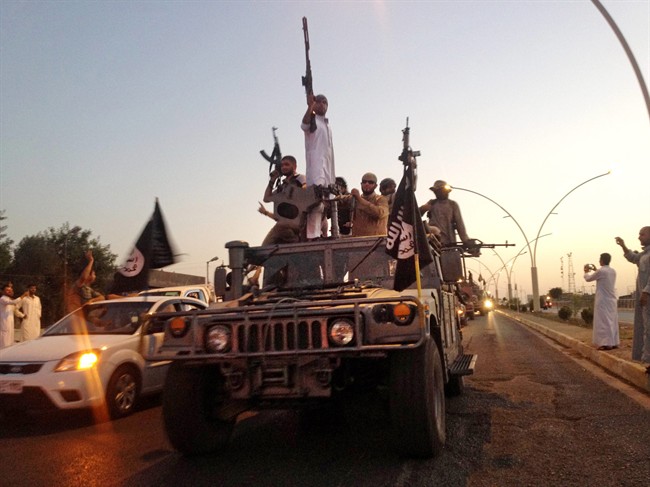Defence Minister Harjit Sajjan says he is hopeful that Canada’s military mission against the so-called Islamic State can be scaled back in 2017, but those plans could change if one of Iraq’s largest cities remains in the hands of the terrorist group.

“We are committed for the long term, but we will assess every single year what type of changes are needed,” the minister said Wednesday when asked about the current situation in the city of Mosul.
Mosul is Iraq’s second-largest urban centre, and is seen as both a key stronghold for ISIS and a critical target for the coalition forces attempting to shake the group’s hold on Northern Iraq. Nearly two years after ISIS captured the city and staged a parade down its central streets, no one knows precisely how many of the two million residents may still be living there – or how many militants are stationed inside.
Speaking to the House of Commons Standing Committee on National Defence on Tuesday, Sajjan said he was optimistic that the Canadian mission could be re-oriented by next year to reduce military action and prioritize humanitarian and development efforts in the region.
But if Mosul isn’t liberated by then, it could prove challenging. The city is strategically centered along key lines of transportation, and as long as ISIS holds it, the area is likely to remain unstable.
“Right now, the coalition commanders and the leadership are assessing the situation and making sure that we have the right plan,” Sajjan said Wednesday. “Not just for Mosul, but looking at the entire country.”
One Iraqi commander told American television station CBS last week that he believes “about 75 or 80 per cent” of the civilians living in Mosul will welcome the city’s liberation, whenever it comes.
Canada’s possible role in that liberation remains up in the air, according to Sajjan.
“We’ve had the early conversations about what (is) needed for the fight and, you know, looking at Mosul as well,” he said
Before the federal government pulled Canada’s CF-18 fighter jets out of the conflict in February, the warplanes were focusing heavily on targets in the areas just outside the city. With the recent tripling of special forces on the ground assisting local Kurdish Peshmerga fighters, some sort of Canadian involvement in the looming ground battle is almost certain.

Get daily National news
WATCH: video purportedly shows ISIS smashing ancient artifacts at Mosul Museum
According to David Perry, a senior analyst with the Canadian Global Affairs Institute, a lot will depend on which troops (Iraqi Security Forces or Peshmerga) are sent into the city, and which units stay outside to cut off escape routes and maintain a perimeter.
“It could be that the forces that Canada is advising are more focused on holding ground,” Perry said.
Preparing for the final push
For now, coalition forces and local troops are working to cut off transportation networks and supplies to Mosul, said Perry. They are also re-taking the towns around it, like Sinjar, to make it harder for Islamic State fighters to call for back-up when the final push begins.
“In terms of how long (the final battle) will take, it’s kind of an open question,” Perry said.
“I think a lot of it depends on exactly what ISIS does in response, and it depends on how quickly (opposing forces) can move while trying to limit the civilian casualty rates.”
The fight to re-take the city of Ramadi was comparatively quick, Perry said, but moving through a city is always trickier than fighting in more open areas. Sight-lines are often limited, for example, and booby traps are almost a certainty in Mosul after two years of ISIS occupation.
“The activity to retake it is going to be pretty difficult,” Perry predicted.
A dam in distress
Even as fighters on both sides ready themselves, there’s a chance that Mother Nature could bring an abrupt end to the conflict over Mosul. A massive dam located near the city is dangerously close to structural failure.
If it does collapse, it could result in 15 metres of water pouring into Mosul within a few hours. Maintenance workers abandoned the dam, which has had structural issues since it was built in the 1980s, when ISIS captured it for several weeks in 2014.
The U.S. ambassador to the United Nations tweeted about the possible crisis on Wednesday:
“If the dam fails, it will be catastrophic,” the head of U.S. Central Command, Gen. Lloyd Austin III, confirmed to a U.S. Senate committee hearing earlier this week.
“There will be thousands of people downstream that will either be injured or killed, certainly displaced. And the damage could extend all the way down to – close to Baghdad, or into Baghdad.”
WATCH: Workers conduct emergency maintenance on Mosul dam in Iraq



Comments